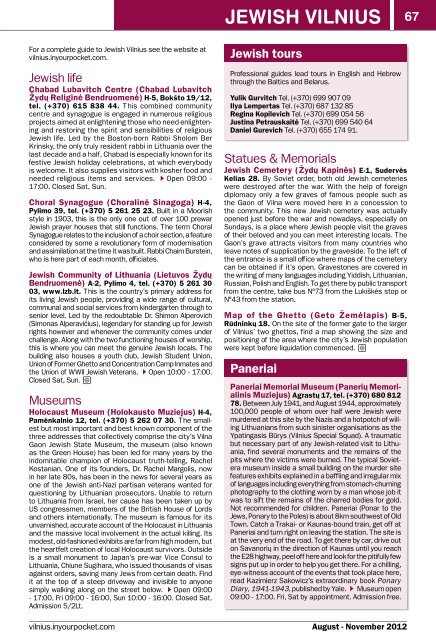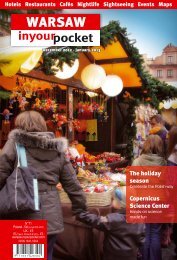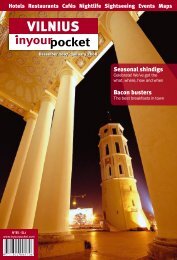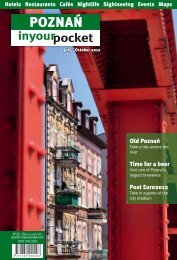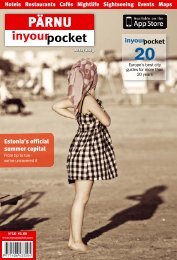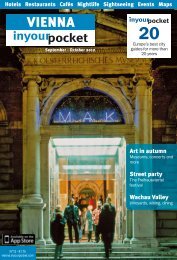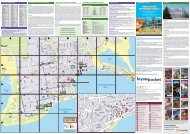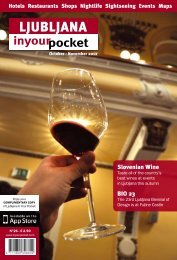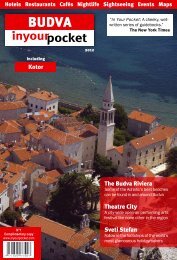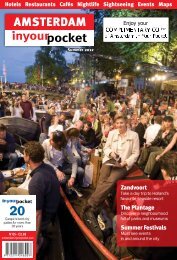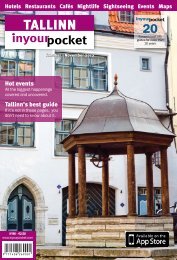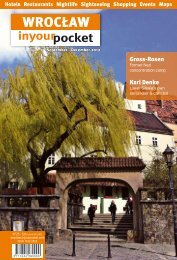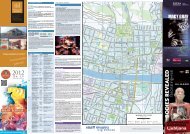VILNIUS - In Your Pocket
VILNIUS - In Your Pocket
VILNIUS - In Your Pocket
You also want an ePaper? Increase the reach of your titles
YUMPU automatically turns print PDFs into web optimized ePapers that Google loves.
For a complete guide to Jewish Vilnius see the website at<br />
vilnius.inyourpocket.com.<br />
Jewish life<br />
Chabad Lubavitch Centre (Chabad Lubavitch<br />
Žydų Religinė Bendruomenė) H-5, Bokšto 19/12,<br />
tel. (+370) 615 838 44. This combined community<br />
centre and synagogue is engaged in numerous religious<br />
projects aimed at enlightening those who need enlightening<br />
and restoring the spirit and sensibilities of religious<br />
Jewish life. Led by the Boston-born Rabbi Sholom Ber<br />
Krinsky, the only truly resident rabbi in Lithuania over the<br />
last decade and a half, Chabad is especially known for its<br />
festive Jewish holiday celebrations, at which everybody<br />
is welcome. It also supplies visitors with kosher food and<br />
needed religious items and services. QOpen 09:00 -<br />
17:00. Closed Sat, Sun.<br />
Choral Synagogue (Choralinė Sinagoga) H-4,<br />
Pylimo 39, tel. (+370) 5 261 25 23. Built in a Moorish<br />
style in 1903, this is the only one out of over 100 prewar<br />
Jewish prayer houses that still functions. The term Choral<br />
Synagogue relates to the inclusion of a choir section, a feature<br />
considered by some a revolutionary form of modernisation<br />
and assimilation at the time it was built. Rabbi Chaim Burstein,<br />
who is here part of each month, officiates.<br />
Jewish Community of Lithuania (Lietuvos Žydų<br />
Bendruomenė) A-2, Pylimo 4, tel. (+370) 5 261 30<br />
03, www.lzb.lt. This is the country’s primary address for<br />
its living Jewish people, providing a wide range of cultural,<br />
communal and social services from kindergarten through to<br />
senior level. Led by the redoubtable Dr. Shimon Alperovich<br />
(Simonas Alperavičius), legendary for standing up for Jewish<br />
rights however and whenever the community comes under<br />
challenge. Along with the two functioning houses of worship,<br />
this is where you can meet the genuine Jewish locals. The<br />
building also houses a youth club, Jewish Student Union,<br />
Union of Former Ghetto and Concentration Camp <strong>In</strong>mates and<br />
the Union of WWII Jewish Veterans. QOpen 10:00 - 17:00.<br />
Closed Sat, Sun. J<br />
Museums<br />
Holocaust Museum (Holokausto Muziejus) H-4,<br />
Pamėnkalnio 12, tel. (+370) 5 262 07 30. The smallest<br />
but most important and best known component of the<br />
three addresses that collectively comprise the city’s Vilna<br />
Gaon Jewish State Museum, the museum (also known<br />
as the Green House) has been led for many years by the<br />
indomitable champion of Holocaust truth-telling, Rachel<br />
Kostanian. One of its founders, Dr. Rachel Margolis, now<br />
in her late 80s, has been in the news for several years as<br />
one of the Jewish anti-Nazi partisan veterans wanted for<br />
questioning by Lithuanian prosecutors. Unable to return<br />
to Lithuania from Israel, her cause has been taken up by<br />
US congressmen, members of the British House of Lords<br />
and others internationally. The museum is famous for its<br />
unvarnished, accurate account of the Holocaust in Lithuania<br />
and the massive local involvement in the actual killing. Its<br />
modest, old-fashioned exhibits are far from high modern, but<br />
the heartfelt creation of local Holocaust survivors. Outside<br />
is a small monument to Japan’s pre-war Vice Consul to<br />
Lithuania, Chiune Sugihara, who issued thousands of visas<br />
against orders, saving many Jews from certain death. Find<br />
it at the top of a steep driveway and invisible to anyone<br />
simply walking along on the street below. QOpen 09:00<br />
- 17:00, Fri 09:00 - 16:00, Sun 10:00 - 16:00. Closed Sat.<br />
Admission 5/2Lt.<br />
vilnius.inyourpocket.com<br />
Jewish vilnius<br />
Jewish tours<br />
Professional guides lead tours in English and Hebrew<br />
through the Baltics and Belarus.<br />
Yulik Gurvitch Tel. (+370) 699 907 09<br />
Ilya Lempertas Tel. (+370) 687 132 85<br />
Regina Kopilevich Tel. (+370) 699 054 56<br />
Justina Petrauskaitė Tel. (+370) 699 540 64<br />
Daniel Gurevich Tel. (+370) 655 174 91.<br />
Statues & Memorials<br />
Jewish Cemetery (Žydų Kapinės) E-1, Sudervės<br />
Kelias 28. By Soviet order, both old Jewish cemeteries<br />
were destroyed after the war. With the help of foreign<br />
diplomacy only a few graves of famous people such as<br />
the Gaon of Vilna were moved here in a concession to<br />
the community. This new Jewish cemetery was actually<br />
opened just before the war and nowadays, especially on<br />
Sundays, is a place where Jewish people visit the graves<br />
of their beloved and you can meet interesting locals. The<br />
Gaon’s grave attracts visitors from many countries who<br />
leave notes of supplication by the graveside. To the left of<br />
the entrance is a small office where maps of the cemetery<br />
can be obtained if it’s open. Gravestones are covered in<br />
the writing of many languages including Yiddish, Lithuanian,<br />
Russian, Polish and English. To get there by public transport<br />
from the centre, take bus Nº73 from the Lukiškės stop or<br />
Nº43 from the station.<br />
Map of the Ghetto (Geto Žemėlapis) B-5,<br />
Rūdninkų 18. On the site of the former gate to the larger<br />
of Vilnius’ two ghettos, find a map showing the size and<br />
positioning of the area where the city’s Jewish population<br />
were kept before liquidation commenced. J<br />
Paneriai<br />
Paneriai Memorial Museum (Panerių Memorialinis<br />
Muziejus) Agrastų 17, tel. (+370) 680 812<br />
78. Between July 1941, and August 1944, approximately<br />
100,000 people of whom over half were Jewish were<br />
murdered at this site by the Nazis and a hotpotch of willing<br />
Lithuanians from such sinister organisations as the<br />
Ypatingasis Būrys (Vilnius Special Squad). A traumatic<br />
but necessary part of any Jewish-related visit to Lithuania,<br />
find several monuments and the remains of the<br />
pits where the victims were burned. The typical Sovietera<br />
museum inside a small building on the murder site<br />
features exhibits explained in a baffling and irregular mix<br />
of languages including everything from stomach-churning<br />
photography to the clothing worn by a man whose job it<br />
was to sift the remains of the charred bodies for gold.<br />
Not recommended for children. Paneriai (Ponar to the<br />
Jews, Ponary to the Poles) is about 8km southwest of Old<br />
Town. Catch a Trakai- or Kaunas-bound train, get off at<br />
Paneriai and turn right on leaving the station. The site is<br />
at the very end of the road. To get there by car, drive out<br />
on Savanorių in the direction of Kaunas until you reach<br />
the E28 highway, peel off here and look for the pitifully few<br />
signs put up in order to help you get there. For a chilling,<br />
eye-witness account of the events that took place here,<br />
read Kazimierz Sakowicz’s extraordinary book Ponary<br />
Diary, 1941-1943, published by Yale. Q Museum open<br />
09:00 - 17:00. Fri, Sat by appointment. Admission free.<br />
August - November 2012<br />
67


